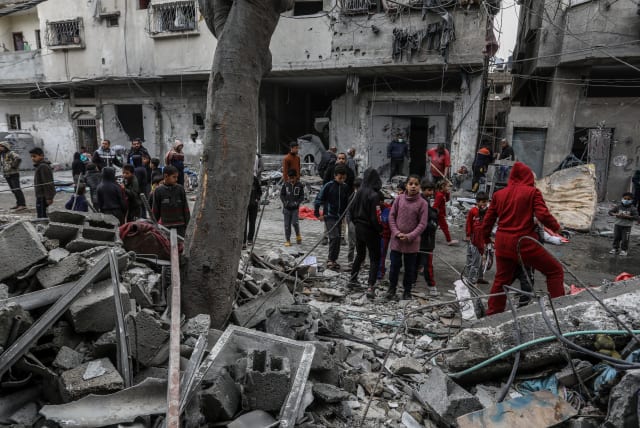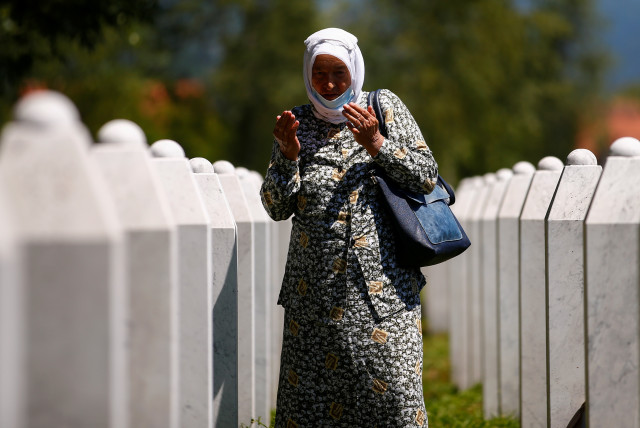Kosovo isn’t Gaza, and Gaza isn’t Kosovo - comment

War crimes. Genocide. Crimes against humanity. These terms have been repeated so regularly over the past six months concerning Israel’s war against Hamas that they have begun to lose their meaning.
As a young boy growing up in England, I remember watching the evening news and seeing a Balkan black sky light up with the orange flashes as nightly air raids took place. NATO forces were attacking Belgrade, capital of Serbia, and what little was left of the Yugoslav Army as it marched through Kosovo, targeting the majority Muslim ethnically Albanian population in an act of ethnic cleansing and war crimes. Exotic, foreign words were added to my lexicon that I never knew before: Yugoslavia; Kosovo; Milosevic.
Growing up, a fascination with the disintegration of Yugoslavia and the resulting wars developed, and I discovered a world of drama, pain, and despair that had not been seen in Europe since the end of World War II.
I can remember watching the trial of Yugoslav and Serbian president Slobodan Milosevic unfold on charges of genocide, crimes against humanity, and war crimes committed in Croatia, Bosnia and Herzegovina, and Kosovo throughout the 1990s.
My mind was brought back to Kosovo this week as the country – independent from Serbia since 2008 – marked the 25th anniversary of NATO’s Operation Allied Force on Sunday, when Kosovo’s President Vjosa Osmani laid a wreath at the NATO monument in the capital city of Pristina.
Osmani thanked NATO for “not turning a blind eye to the suffering of the Kosovar people at that time.”
Back then, Kosovo was an autonomous republic within Serbia, with a majority Muslim ethnically Albanian population compared with the rest of Serbia, which was predominantly Orthodox Christian. Serbia itself, along with Montenegro, were the remnants of what was once Yugoslavia, decimated through the 1990s after Slovenia, Croatia, and then Bosnia successively declared independence. A series of wars ensued under the guise of “keeping Yugoslavia together,” but they ultimately were seen as the Serbs’ attempts to create a “Greater Serbia.”
The Kosovo War witnessed extensive and systematic violence perpetrated by Serbian forces against ethnic Albanians. This brutality included mass killings, forced displacements, and widespread rape, with large-scale, ethnic-cleansing campaigns targeting Albanian populations to expel them from Kosovo.
Is what happened in Kosovo similar to the war in Gaza?
War crimes. Genocide. Crimes against humanity. These are terms that we have heard bandied about so regularly over the past six months with regard to Israel’s war against Hamas in response to the October 7 massacre that eventually, they begin to lose all meaning.
Government officials, UN representatives, student bodies, and allegedly pro-Palestinian protesters have all used such terminology aimed at Israel since the war’s start, and the supposed informed reports that one sees plastered over news bulletins or social media prove that if you “repeat a lie often enough, it becomes the truth.”
In January, South Africa accused Israel of “genocide” at the International Court of Justice (ICJ) at The Hague, the same Hague where Serbia’s Milosevic went on trial. US Secretary of State Antony Blinken called the claim of genocide “meritless,” while other nations, such as Germany and the United Kingdom, described the claim as “unjustified” and “wrong.”
At the conclusion of the court hearings, the ICJ ordered Israel to prevent acts of genocide against Palestinians, but a follow-on case of proof of genocide will take years to examine before any court verdict is delivered.
The contexts and dynamics of the two conflicts exhibit stark disparities. The Kosovo War emerged from long-standing tensions between ethnic Albanians and Serbs, exacerbated by the dissolution of Yugoslavia and the oppressive policies of the Serbian government under Milosevic. Conversely, the conflict in Gaza is rooted in the Israeli-Palestinian dispute over land, borders, and national self-determination, marked by intricate historical, political, and religious dimensions.
Furthermore, the nature of violence and the parties involved present notable distinctions. In Kosovo, the conflict primarily pitted state security forces against ethnic Albanian insurgents and civilian populations. On the other hand, the conflict in Gaza involves confrontations between the IDF and various Palestinian factions, including Hamas, which governs the Gaza Strip.
So, why is Israel constantly accused of war crimes and attempted genocide against the Palestinians, especially with such blurred lines when compared with recent examples?
One would think that unlike the Serbs – who numerically dominated but were officially under the command of the Yugoslav Army – who marauded through Kosovo committing unspeakable acts against the ethnic Albanian population, genocide would be simpler to prove against Israel.
Israel is a nuclear power, with a fantastically strong army compared with its regional neighbors. It is allegedly attempting to destroy a people that it has tried to live alongside for 75 years, offering peace deal after peace deal, but to no avail.
One would think that if Israel truly attempted genocide against the Palestinians, in reality, it would not be that difficult to carry out. Israelis believe in the morality of the IDF. On October 7, Hamas committed the worst massacre of Jews since World War II: More than 1,200 Israelis were murdered in their homes or at a music festival simply for being Jewish. That is a more apt charge for genocide.
After NATO completed its bombing of the Serbs, a UN peacekeeping force was deployed to Kosovo to maintain peace there. The future of Gaza remains less clear about who will be in charge once Israel’s military campaign is over. Israel is adamant that there will be no Hamas nor Palestinian Authority involvement in the managing of the Strip.
As the war against Hamas rolls on, as each day passes with Israeli hostages still held in captivity in Gaza, and as the army tries to dismantle a terrorist organization embedded within the government of an enemy entity, I think of those on both sides who are suffering and hope this conflict will end sooner rather than later.
I think of the little boy watching nightly bombings in Kosovo on TV. I remember the pain etched on peoples’ faces as their lives were changed forever, and then my mind turns to Gaza. But then I remember that Kosovo isn’t Gaza, and Israel isn’t Yugoslavia.
Jerusalem Post Store
`; document.getElementById("linkPremium").innerHTML = cont; var divWithLink = document.getElementById("premium-link"); if (divWithLink !== null && divWithLink !== 'undefined') { divWithLink.style.border = "solid 1px #cb0f3e"; divWithLink.style.textAlign = "center"; divWithLink.style.marginBottom = "15px"; divWithLink.style.marginTop = "15px"; divWithLink.style.width = "100%"; divWithLink.style.backgroundColor = "#122952"; divWithLink.style.color = "#ffffff"; divWithLink.style.lineHeight = "1.5"; } } (function (v, i) { });

